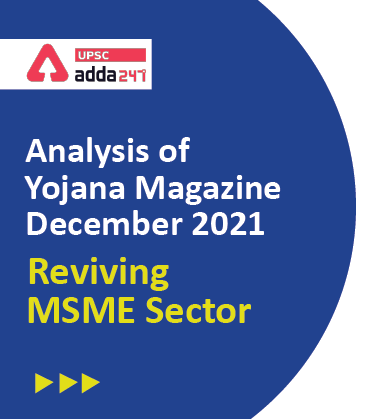Table of Contents
Introduction
- India is one of the fastest-growing economies in the world. In India’s GDP, the contribution of agriculture is 15%, manufacturing is 31 %, and 54% is catered by the service sector.
- India is ranked third in the world in terms of Purchasing Power Parity (PPP) GDP, with USD 8.9 trillion.
- Indian MSME sector is one of the major contributors to the Gross Domestic Product (GDP) of the country, as it shares more than a quarter of GDP contribution through service[1]related activities and more than one-third GDP contribution from manufacturing activities.
Atmanirbhar Bharat Abhiyaan and MSME Sector
- The government implemented numerous ambitious reforms under the Atmanirbhar Bharat Abhiyaan, including agricultural supply chain improvements, rational tax systems, simple and clear laws, capable human resources, and a strong financial system.
- India’s PPE industry grew to 10,000 crores making it the world’s second-largest.
- Collateral-free Automatic Loans for Businesses, including MSMEs Guaranteed Emergency Credit Line (GECIL) Scheme, announced in February 2020, helped businesses, including MSMEs, with a revenue of up to 100 crore and outstanding credit of up to 25 crores.
- A financial support provided in the form of a sub-debt credit issued by the lending institution to the promoters of MSME units up to 15% of the promoter’s share, or Rs 75 lakh, whichever is less was another fillip.
Contribution of MSME Sector in India
- The contribution of the MSME Sector is 31% to the overall GDP of the country, out of which 6.1 % is from the manufacturing sector and the rest from the trade and service sector.
- MSME’s contribution to manufacturing output is around 35% while contribution to total export is 48%. There are around 33000 registered MSME exporters in India.
- The total number of MSME units in India is 6.34 crores and the sector employs 11.75 crores people which constitutes 40% of the workforce in India.
- Unfortunately, only 14% of MSMEs have a formal source of finance. Their Non-performing assets (NPA) are around 8 to 11%, which is very high.
What are the new criteria for the categorisation of MSMEs?
The following criteria for the categorisation of micro, small, and medium firms are in force, with effect since 2020:-
1. A micro-enterprise, defined as an investment in Plant and Machinery or Equipment of less than one crore rupees and revenue of less than five crore rupees.
2. A small firm with an investment in Plant and Machinery or Equipment of less than ten crore rupees and revenue of less than fifty crore rupees.
3. A medium-sized firm, with an investment in Plant and Machinery or Equipment of no more than fifty crore rupees and a turnover of no more than two hundred and fifty crore rupees.
What is Production-Linked Incentive (PLI) Scheme?
- PLI programme was created to build national manufacturing champions and provide job possibilities for the country’s young, as well as to promote manufacturing at home by giving production incentives and encouraging investments from both within and outside the country.
- The minimum output in India because of PLI Schemes is anticipated to be more than USD 500 billion in five years.
- The Finance Minister declared expenditure of Rs 1.97 lakh crores for the Production-Linked Incentive (PLI) Schemes for 13 important industries in the Union Budget 2021-22.
- The first three PLI Schemes (Electronic/ Technology Products, Pharmaceuticals Drugs, and Telecom & Networking Products) were approved in March 2020 and were quickly followed by another seven New PLI Schemes in food processing, speciality steel, automobiles and auto components, solar photovoltaic modules, white goods such as air conditioners and LEDs Advance Chemistry Cell (ACe) Battery, Textile Products such as MMF segment and technical textiles.
- The Production-Linked Incentive (PLI) provides incentives for increased sales (over the fiscal year 2019-20) from items made in domestic facilities.
What is Startup India Seed Fund Scheme?
- The Startup India Seed Fund Scheme supports companies with proof of concept, prototype development, product testing, market entrance, and commercialisation.
- The Seed Fund is distributed to qualified companies across India via approved incubators.
- Grants of up to Rs 20 lakhs are provided for the validation of Proof of Concept, prototype development, or product testing.
- Investment of up to Rs 50 lakhs for market entrance, commercialisation, or scaling up via convertible debentures, loans, or debt-linked securities.
- MSMEs are offered training under the Skill India programme to improve and provide practical training to entrepreneurs on a variety of skills. Every Central Ministry/DepartmentiPSU sets an annual goal for procurement from the sector at the beginning of the year, to achieve an overall procurement goal of at least 25% of total annual purchases from the products or services produced or rendered by MSMEs.
- In the fiscal year 2020-21, the Government of India purchased products worth around Rs 1.25 lakh crores, of which approximately Rs 40000 crores came from the MSE sector. International Cooperation scheme provides 100% of space rent paid to MSME units, limited to Rs 3 lakhs.
- Collateral-free loans for businesses, including MSMEs are also provided under Atmanirbhar Bharat Abhiyaan.



 TSPSC Group 1 Question Paper 2024, Downl...
TSPSC Group 1 Question Paper 2024, Downl...
 TSPSC Group 1 Answer key 2024 Out, Downl...
TSPSC Group 1 Answer key 2024 Out, Downl...
 UPSC Prelims 2024 Question Paper, Downlo...
UPSC Prelims 2024 Question Paper, Downlo...
